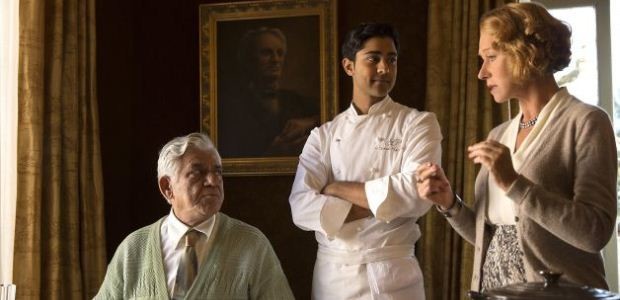Would you be curious enough to try some French toast sprinkled with Madras Masala? If you do, you will find From Bombay to Paris: The Hundred-Foot Journey a charming film with plenty of warm and fuzzy moments aimed straight for the heart.
Produced by Steven Spielberg and Oprah Winfrey (amongst other bigwigs in India and the UAE), The Hundred-Foot Journey is a cinematic adaptation of a bestselling novel of the same name by Richard C. Morais. While the novel makes for light reading on a long-haul flight, the film stands out as one of those rare achievements where its cinematic creation is on par with the author’s imagination from the source material. Beginning with tragic events in the opening scene, the story follows the Kadam family when they are forced to flee from their home town in Mumbai for better prospects in Europe. After trial and error, the Kadams end up in a picturesque hamlet in the South of France. This is where Papa Kadam (Om Puri) decides to re-launch the family owned business after buying a defunct old restaurant building. But just hundred-feet across their newly opened restaurant ‘Maison Mumbai’, stands the prestigious ‘Le Saule Pleureur,’ a Michelin star awarded restaurant widely known for its French haute cuisine and patronage that includes various state dignitaries. With stringent quality measures upheld by the whip cracker proprietor, Madame Mallory (the always lovely Helen Mirren), you can just imagine what happens next. Not only is Madame appalled by immigrants across the street, her quest for a second Michelin star turns into a nightmare, thus resulting in a culinary clash of cultures.
Culture clash being the main theme, we’ve seen it before in films like East is East (Om Puri’s prior cultural satire as a Pakistani immigrant in the UK) and the more recent The Best Exotic Marigold Hotel (Dev Patel opposite Judi Dench and her flock of British pensioners in India). With pots and pans flying off the handle, at first I was expecting the setup to be a spy versus spy battle of wits. In fact, the first hour is drawn into a farce of gastronomical proportions, arising from unhealthy competition about healthy cooking. “It’s war”, as Papa retaliates to Madam’s unscrupulous tactics at shutting them down. This is also where the story takes on a dark tone when comical situations turn into acts of xenophobia. But before it gets any darker, Chocolat director Lasse Hallstrom turns the spotlight onto a key character – Hassan Kadam (Manish Dayal), Papa’s son who goes from an underestimated cook to a prodigy in the culinary arts. Hassan’s dedication to master the Indian cuisine while learning all there is to know about French cooking becomes the film’s turning point (in a fairytale sort of way), by bridging the cultural divide into a fusion of flavors. Part of that fairytale extends into elements of romance and drama when Hassan’s dedication is impaired by flirtatious shenanigans with Madam’s sous chef Marguerite (Charlotte Le Bon). Dayal and Le Bon share light chemistry, but it is the latter’s character that turns out to be the catalyst in sparking Hassan’s creativity.
While the outcome is fairly predictable, it must be said that the director keeps the story palatable largely due to true fusion of talent. Having played queens, assassins and calendar girls, Mirren is at her finest as a regal yet uncompromising Frenchwoman. And tasked with breaking down those defenses, veteran Indian thespian Puri delivers with the sort of boisterous nuance we have grown to love about him. But when they are in the same frame it’s hard to root for either one. On the other hand, Dayal and Le Bon are charming in their own way but their predictable romance does give the film a muddily off-spin in the third act. That being said, it is in no way overdone as the melodramatic and overrated Slumdog Millionaire. There are other flaws too, but not worth mentioning because the film is generally quite overwhelming with subtle moments that could squeeze out a tear or two. Garnishing those moments are Oscar winning music composer A.R. Rehman’s score and Linus Sandgren’s magical cinematography that transcends time and place; both technical achievements that are perfectly integrated into the story.
From Bombay to Paris: The Hundred-Foot Journey may not be a masterpiece, but it is still recommended as a feel-good film and a trip worth taking to the cinema.
Rating: 




